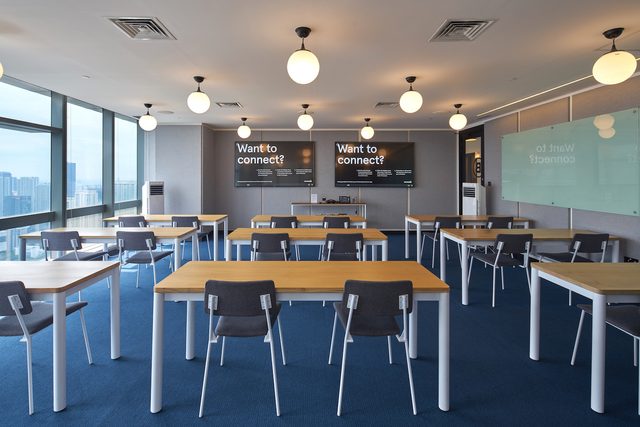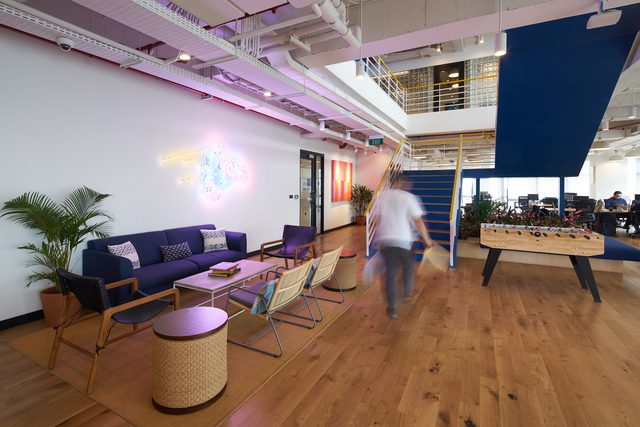Partner content in association with
Why enterprise businesses looking to expand need to seriously consider coworking spaces
The work area at WeWork Sinarmas MSIG Tower Jakarta
Coworking spaces are catching on in Southeast Asia. The number of operators and the space available has nearly doubled since 2017, according to recent research from global real estate services firm JLL. Chris Clausen, Director, Asia Pacific Research and Consultancy, JLL attributes this surge to the office market penetration in cities such as Manila and Kuala Lumpur, lagging behind their peers in Southeast Asia and across the wider Asia region.
The increase in space and the number of operators is however not the biggest change. One of the most significant shifts is in the profile of tenants. An increasing number of companies who have signed up, belong to the enterprise segment – firms with 50 and above employees. It is evidence of the growing maturity and sophistication of coworking spaces.
According to a recent report from Morningstar, “The industry is focused on attracting more enterprise clients. From 2012 to 2017, the proportion of freelancers in coworking spaces fell to 41 per cent from 55 per cent, while company employers and employees grew to 52 per cent from 40 per cent.”
Globally, the enterprise segment constitutes 43 per cent of the clientele at WeWork, a pioneer and market leader in the coworking domain. The number is even higher for the company in Singapore with a 50 per cent split between enterprise clients and the rest.

Across Southeast Asia, some of the biggest names who have signed up with WeWork include Pinterest, LOTTE Hotels & Resorts, Klook, Sinar Mas Mining, Garmin, Janio and even government departments in Singapore like The Ministry of Culture, Community, and Youth (MCCY) and Government Technology Agency (GovTech).
The trend in Southeast Asia mirrors the shift in client profile across the rest of the world. Globally, two-thirds of Fortune 50 companies have memberships with WeWork and its tenants include Microsoft, Liberty Mutual, GE, Dropbox, Stripe, Salesforce, and Standard Chartered.
Larger corporations are not just embracing coworking spaces, they are also remaining committed to these spaces for a far longer duration. For instance, job search portal Indeed’s Singapore engineering centre was looking for a workspace that was large and flexible enough to keep pace with its rapid growth. At WeWork, Indeed was able to access customised solutions to accommodate three expansions across a 24 month period. During this time frame, Indeed moved from a private office in 2017, to a dedicated floor at WeWork’s 60 Anson location.
Speaking about the experience, Jordan Dea-Mattson, Director of Indeed’s Singapore Engineering Centre says, “No one could have predicted how fast we would grow. If we had gone the traditional route of renting office space, it would have been more difficult to scale at will.
Partnering with WeWork gives us the flexibility and peace of mind to be dynamic with our growth, without worrying about real estate needs and costs.”
No surprise then that the Morningstar report highlights flexibility as one of the main reasons why companies opt for coworking spaces. According to the Morningstar report, “The current configuration of the office real estate industry features long-term leases often exceeding 10 years with predictable rent increases.
“But tenants have demonstrated a voracious appetite for more flexible arrangements. Apart from established corporate tenants, most tenants are drawn to the flexibility, lower upfront capital costs, and the ability to share resources that coworking provides. We view this shift as less of a revolutionary disruption, but rather a long overdue reconfiguration of the structure of the office real estate industry. As such, coworking represents not only a tectonic shift but also an opportunity for the office real estate industry. We expect the rise of coworking to tap into this latent demand and bring it to the fore, representing an industry shift that investors and owners of office real estate would be well advised to heed.”

The global disruptions caused by COVID-19 have brought flexibility more sharply into focus. But the broad trends have preceded the pandemic and are likely to move into a higher gear once it is over. And the reasons go beyond more comfortable monetary and lease commitment terms.
Culture, community, innovation, and future-proofing have all emerged as important factors pushing the enterprise segment towards coworking arrangements. Sectors such as financial services have been particularly proactive in seeking these spaces out. Their relevance is apparent for any business with a desire to ensure business continuity planning. In the event of unexpected disruptions to the more traditional office setups, coworking spaces provide a ready base to quickly get up to speed and scale.
This is particularly useful for organizations like Indeed who are in an expansion mode, firms with split team arrangements or even companies who encourage their employees to work closer to home.
Such relationships work best with a coworking space partner who has a large existing network. WeWork, for instance, is present across 37 countries and 740 locations. It has built its offering around a flexible structure, with an up to 50 per cent reduction in committed costs and an increased speed to market that is 3 times faster than traditional options.
While the conventional image of open office plans doesn’t speak to companies that require a larger private space, locations like WeWork’s 18 Parc Place in the business district of Jakarta allow enterprises to lease full-floor private offices.
All of which makes coworking spaces the perfect venue for even large companies looking to expand out of the stodgy headquarters, or who want a more collaborative, intellectually stimulating environment to work in.
This content was created in collaboration with WeWork which is currently expanding its footprint in Central Jakarta. Sign up for a virtual, private consultation and tour of a WeWork location.

